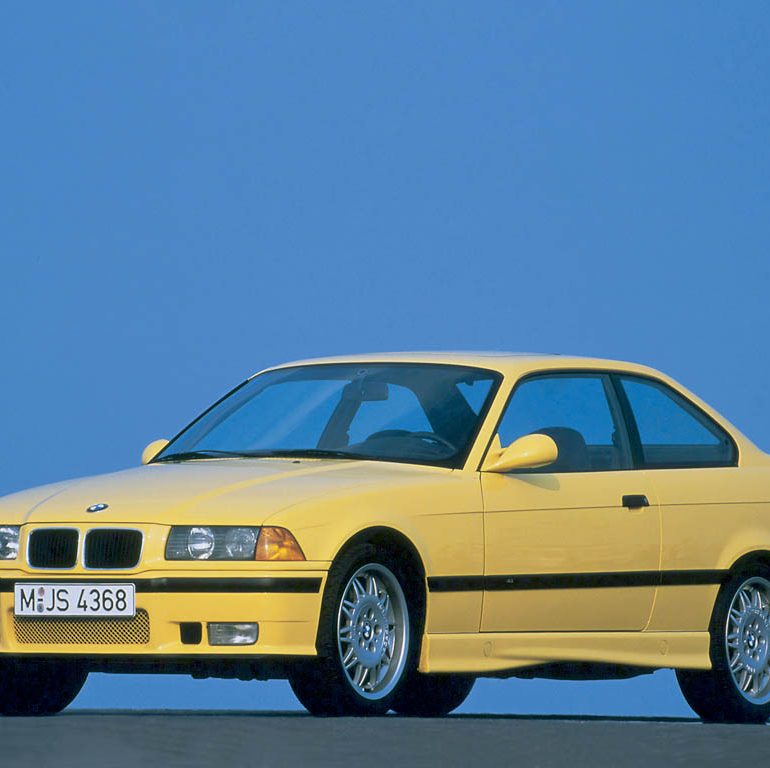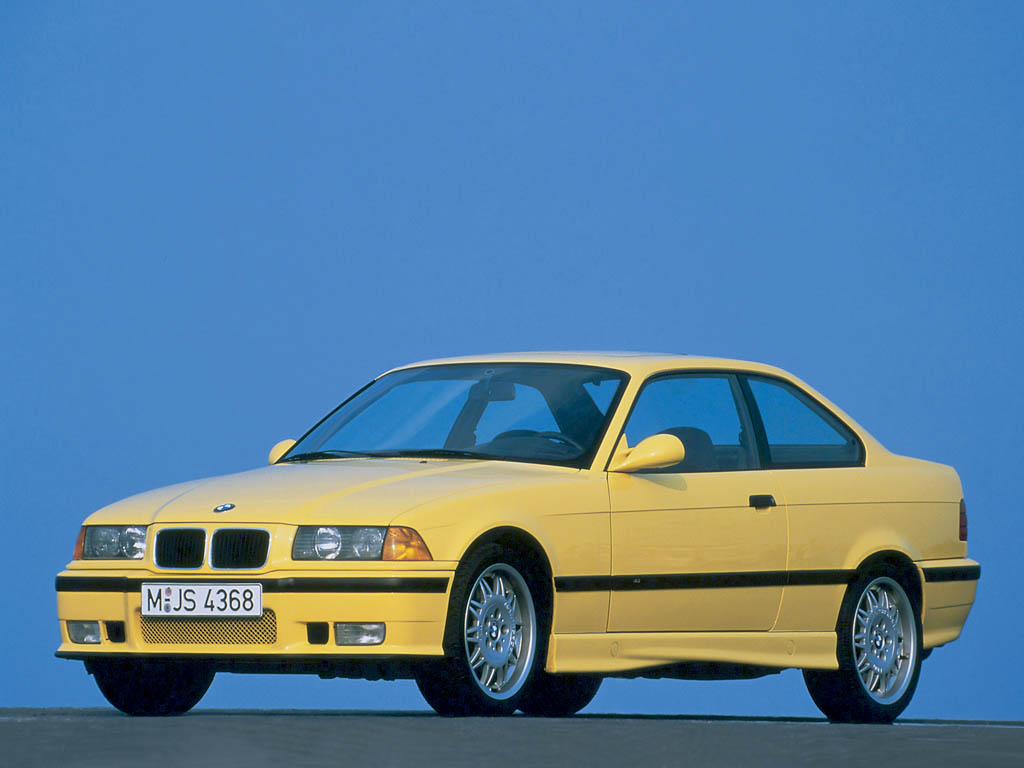1992 BMW M3
Released at the 1992 Paris Auto Show was BMW Motorsport’s version of the E36 three series coupe. This model was followed in 1994 by both a sedan and convertible version. All M3s were built at the regular 3 Series assembly line at the Regensburg factory near Munich.
The S50 engine provided a basis for all E36 M3s . It was a derivative of the M50TU, 24-valve, inline-six used in many BMW models such as the 1992 E36 325i and 1992 E34 525i . BMW Motorsport took this engine, increased its bore and stroke and modified the intake to include individual throttle bodies and added a new technology called VANOS. The VANOS gear featured continuous variable valve timing on the intake camshaft. With the adoption of the VANOS, the engine was known as the S50 B30.
Chassis modifications to the E36 M3 included new suspension geometry with firmer shocks and springs with larger anti-roll bars. In addition, an M-tuned variable-ratio steering rack was installed as was four-wheel vented disc brakes measuring 12 inches.
Cosmetically, the E36 M3 shared much design language with the regular three series. From the outside, only deeper side valance panels and a front air dam distinguish the M3. As a dealer option, some cars received an M-Technic rear spoiler . Inside, an M instrument cluster, M shift knob and M sport seats either in cloth, suede or Nappa leather were exclusive to the M3.
The US E36 M3
After many letters from devoted enthusiasts from the BMW Car Club of America, BMW changed their minds in 1994 and released the E36 M3 to the American market. Unfortunately, in the process BMW developed a specific version of the engine for America called the S50 B30 USA. To keep costs down, the intake system was simplified by exchanging the continuous VANOS unit with a two-stage one. BMW also removed the individual throttle bodies and lowered the compression. As a result the US spec M3s have 240 horsepower @ 6000 rpm.
In 1995, the American M3s were offered with ZF 5HP18 five-speed automatic transmission as an option. It came with three driving modes which included normal, manual and winter.
In total around 10 000 USA cars were between 1994 to 1995 having the three liter S50 B30 USA engine. Total cars sold outside America equaled 18 500.
Conclusion
Following the legacy of the E30 M3, the E36 falls short of the original intent for the series. Unlike the E30 M3 which was designed for competition purposes, the E36 M3 was developed as a road-going GT that lacked motor sport program. Not until 1994 did BMW make an M3 GTR to run in the ADAC German GT Cup.
In Detail
| production | 28 000 |
| price $ | $40 000 USD |
| engine | S50 B30 Inline-6 |
| position | front Longitudinal |
| aspiration | Natural |
| valvetrain | DOHC, 4 Valves per Cyl w/VANOS Variable Timing |
| fuel feed | Sequential Electronic Fuel Injection |
| displacement | 2990 cc / 182.5 in³ |
| bore | 86 mm / 3.39 in |
| stroke | 85.6 mm / 3.37 in |
| compression | 10.8:1 |
| power | 213.3 kw / 286.0 bhp @ 7000 rpm |
| specific output | 95.65 bhp per litre |
| bhp/weight | 198.61 bhp per tonne |
| torque | 319.97 nm / 236 ft lbs @ 3600 rpm |
| body / frame | Unit Steel |
| driven wheels | RWD w/25% Limited-Slip Differential |
| front tires | 235/40ZR17 |
| rear tires | 235/40ZR17 |
| front brakes | Inner Vented Discs w/ABS |
| f brake size | x 315 mm / x 12.4 in |
| rear brakes | Inner Vented Discs w/ABS |
| r brake size | x 312 mm / x 12.3 in |
| front wheels | F 43.2 x 19.0 cm / 17.0 x 7.5 in |
| rear wheels | R 43.2 x 21.6 cm / 17 x 8.5 in |
| steering | M-Tuned Steerin Rack w/Variable Power Assist |
| f suspension | MacPherson Struts wSprings, Dampers Anti-Roll Bar |
| r suspension | Multi-Link Z-Axle wSprings, Dampers Anti-Roll Bar |
| curb weight | 1440 kg / 3175 lbs |
| wheelbase | 2700 mm / 106.3 in |
| front track | 1422 mm / 56 in |
| rear track | 1445 mm / 56.9 in |
| length | 4432 mm / 174.5 in |
| width | 1709 mm / 67.3 in |
| height | 1336 mm / 52.6 in |
| transmission | ZF Type C 5-Speed Manual |
| gear ratios | 4.20:1, 2.49:1, 1.66:1, 1.24:1, 1.00:1, :1 |
| final drive | 3.15:1 |
| top speed | ~250 kph / 155.3 mph |
| 0 – 60 mph | ~5.8 seconds |
| 0 – 100 mph | ~13.5 seconds |





